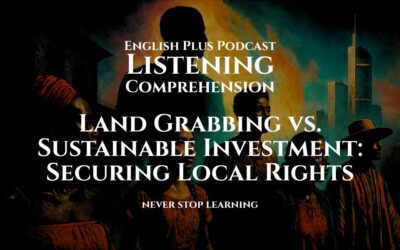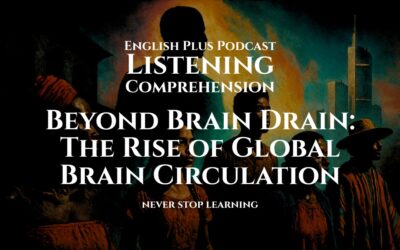Listen | The Human Body
Listening Comprehension Quiz
Transcript: Please don’t check the transcript before you listen and take the quiz.
Good afternoon, everyone! Today, we’re diving into one of the most fascinating and complex parts of the human body—our brain. Now, I know you’ve probably heard people refer to the brain as “the control center of the body,” but have you ever stopped to think about just how true that really is? The brain is responsible for everything we do—whether you’re solving a difficult math problem, running a marathon, or even just breathing while you sleep. And the craziest part? It does all this without you even having to think about it!
The human brain is often compared to a supercomputer, but honestly, that’s selling it short. Even the most advanced computers in the world can’t match the brain’s ability to process information, adapt, and make decisions in real time. So, let’s start by exploring the basic structure of the brain. You’ve probably heard of the different sections—there’s the cerebrum, the cerebellum, and the brainstem. Each part has its own special job. The cerebrum is the largest part and is in charge of things like thinking, memory, and decision-making. It’s divided into two hemispheres, and guess what? Each hemisphere controls the opposite side of your body. So, your left hemisphere is controlling your right hand right now, and vice versa. Pretty cool, right?
Now, let’s talk about the cerebellum, which sits at the back of your brain, just below the cerebrum. This little section of the brain is responsible for coordination and balance. Whether you’re walking a tightrope or just typing on your phone, your cerebellum is working hard to make sure you don’t stumble or drop your device. It’s like the body’s very own internal coach, keeping everything moving smoothly.
And then, there’s the brainstem—the oldest part of the brain, evolutionarily speaking. It’s often called the “reptilian brain” because even animals like reptiles have this part. The brainstem controls all the automatic functions we don’t think about, like our heartbeat, breathing, and digestion. Imagine if you had to remember to tell your heart to beat—life would be exhausting! The brainstem takes care of all that so you can focus on other things, like what’s for lunch.
Now, moving deeper into the brain, we find the limbic system, often referred to as the emotional brain. This area controls our emotions, memories, and even our survival instincts. Ever wonder why you jump when you hear a loud noise? That’s your amygdala, a small but mighty part of the limbic system, kicking into action. It’s your brain’s way of telling you, “Hey, something might be dangerous here, so get ready!” Then we have the hippocampus, another part of the limbic system, which helps you form new memories. Without the hippocampus, you wouldn’t be able to remember what you had for breakfast this morning or what you learned in class yesterday.
Now, we can’t talk about the brain without mentioning neurons. Neurons are the brain’s communication network. Think of them as tiny messengers, constantly sending signals back and forth across the brain and body. These signals move incredibly fast—sometimes at speeds of up to 268 miles per hour. When you touch something hot and pull your hand away immediately, that’s your neurons working in overdrive to get the message from your skin to your brain and back again in a split second. Neurons connect through something called synapses, tiny gaps where neurotransmitters (chemical messengers) carry the signal from one neuron to the next. This communication system is what allows us to think, feel, and move.
Another mind-blowing fact about the brain is how adaptable it is. This is called neuroplasticity. Your brain has the ability to reorganize itself by forming new neural connections throughout your life. This means that even as you grow older, or if you suffer an injury, your brain can adapt and find new ways to function. For example, if someone loses their sight, the areas of the brain that process vision can sometimes be “rewired” to enhance other senses like hearing or touch. It’s almost like the brain is constantly upgrading its own software.
But while the brain is incredibly powerful, it’s also very sensitive. It needs proper fuel—just like a car needs gas. Without enough nutrients, oxygen, and sleep, your brain can’t perform at its best. This is why a healthy diet, regular exercise, and getting enough rest are so important. Have you ever noticed how sluggish your brain feels when you don’t get enough sleep? That’s because sleep is when your brain clears out toxins and processes the information you’ve learned during the day. So, next time you think about pulling an all-nighter before an exam, remember that your brain needs that sleep to help you actually remember everything you’ve studied!
One last thing I want to touch on is creativity. People often associate the left side of the brain with logic and the right side with creativity, but the truth is, the entire brain works together when you’re being creative. Whether you’re painting a picture, writing a story, or solving a puzzle, multiple areas of your brain are lighting up and communicating with each other. Creativity is about making connections between different ideas, and the brain is really good at that. In fact, the more you use your creativity, the more your brain strengthens those connections, making it easier to come up with new ideas in the future.
So, what have we learned about the human brain? It’s not just a simple machine—it’s a complex, ever-evolving organ that shapes who we are. From controlling our basic bodily functions to sparking our deepest thoughts and emotions, the brain is truly remarkable. And the more we learn about it, the more we realize just how much potential it holds. So, take care of your brain, keep challenging it, and remember that it’s always working hard—even when you’re not thinking about it!
Expand Your Vocabulary
- Cerebrum
Meaning: The largest part of the brain responsible for thinking, memory, and voluntary movements.
Context: In the lecture, the cerebrum is described as the control center for higher functions like decision-making and memory.
Everyday Use: When someone says, “Use your brain,” they’re often talking about the cerebrum, which handles logical thinking and problem-solving. - Cerebellum
Meaning: A smaller part of the brain located under the cerebrum that is responsible for coordination and balance.
Context: The cerebellum helps you move smoothly, like when you walk, run, or catch a ball.
Everyday Use: Athletes rely heavily on their cerebellum to maintain balance and coordination in fast-paced sports. - Brainstem
Meaning: The part of the brain that controls automatic functions like breathing, heart rate, and digestion.
Context: The brainstem keeps vital functions running without us having to think about them.
Everyday Use: Your brainstem is at work when you’re asleep, keeping your body functioning without conscious thought. - Limbic System
Meaning: A group of structures in the brain that controls emotions, memory, and survival instincts.
Context: The limbic system helps you respond emotionally to events and store important memories.
Everyday Use: Have you ever felt nervous in a stressful situation? That’s your limbic system kicking in to handle emotions. - Amygdala
Meaning: A small, almond-shaped part of the brain within the limbic system responsible for processing emotions, especially fear.
Context: The amygdala is the brain’s alarm system, reacting quickly to threats by triggering a fear response.
Everyday Use: If you’ve ever jumped when hearing a loud noise, that’s your amygdala reacting instantly. - Hippocampus
Meaning: A part of the limbic system that plays a crucial role in forming new memories.
Context: Without the hippocampus, you wouldn’t be able to remember things like what you learned yesterday or what you ate for breakfast.
Everyday Use: Your hippocampus helps you store memories, so when you remember someone’s name after meeting them, you can thank this part of your brain. - Neurons
Meaning: Nerve cells that transmit signals in the brain and throughout the body.
Context: Neurons are the brain’s communication network, sending messages at lightning speed to help you think, feel, and move.
Everyday Use: Neurons are active when you react quickly, like when you touch something hot and pull your hand away instantly. - Synapses
Meaning: The tiny gaps between neurons where chemical signals are transmitted from one neuron to another.
Context: Synapses allow neurons to communicate, helping to pass messages throughout the brain and body.
Everyday Use: Synapses are like the bridges between neurons, making sure that signals get where they need to go. - Neuroplasticity
Meaning: The brain’s ability to reorganize and form new connections, allowing it to adapt and recover from injury or learn new things.
Context: Neuroplasticity explains why people can recover from brain injuries or learn new skills, even in adulthood.
Everyday Use: When you learn to play a musical instrument, your brain’s neuroplasticity helps build new pathways to master the skill. - Greenhouse Effect
Meaning: A natural process where gases in the Earth’s atmosphere trap heat, keeping the planet warm.
Context: The greenhouse effect is essential for life on Earth, but too much of it can lead to global warming.
Everyday Use: When discussing climate change, the greenhouse effect is often mentioned because it contributes to rising temperatures.
Vocabulary Quiz
Let’s Talk
- The brainstem controls automatic functions like breathing and heart rate. Have you ever thought about how much your body does without you having to think about it? How might our daily lives change if we had to consciously control these basic functions?
- Neuroplasticity allows the brain to adapt and form new connections. Do you think this ability could be used to recover from emotional trauma as well as physical injuries? How does knowing this change the way you approach learning new things?
- The cerebrum controls thinking and decision-making, but have you noticed how sometimes our emotions, controlled by the limbic system, seem to override logic? Can you think of a time when your emotions led you to make a decision that wasn’t entirely logical?
- The hippocampus is essential for memory. How important do you think memory is to our sense of identity? What would life be like if we couldn’t form new memories?
- The amygdala helps us react to fear and danger. How do you think our modern lives, filled with stress but fewer physical dangers, might be affecting our amygdala and emotional responses?
- Creativity involves multiple parts of the brain working together. How do you think exercising creativity, such as through art or problem-solving, might strengthen other areas of your brain?
- The limbic system is responsible for survival instincts and emotions. How do you think these instincts influence our everyday decision-making? Do you think modern life has made some of these instincts less useful?
- Neurons communicate at incredible speeds, allowing us to react instantly to stimuli. What activities in your daily life require fast reaction times, and how do you think your neurons help you in those moments?
- The brain needs proper fuel to function well, just like the rest of your body. How do you think your diet and sleep affect your mental performance? Have you noticed a difference in your thinking or memory when you’re well-rested versus sleep-deprived?
- The brain’s ability to adapt through neuroplasticity suggests that we can continue learning and growing throughout our lives. What skills or habits do you want to work on, knowing that your brain can keep adapting?










0 Comments